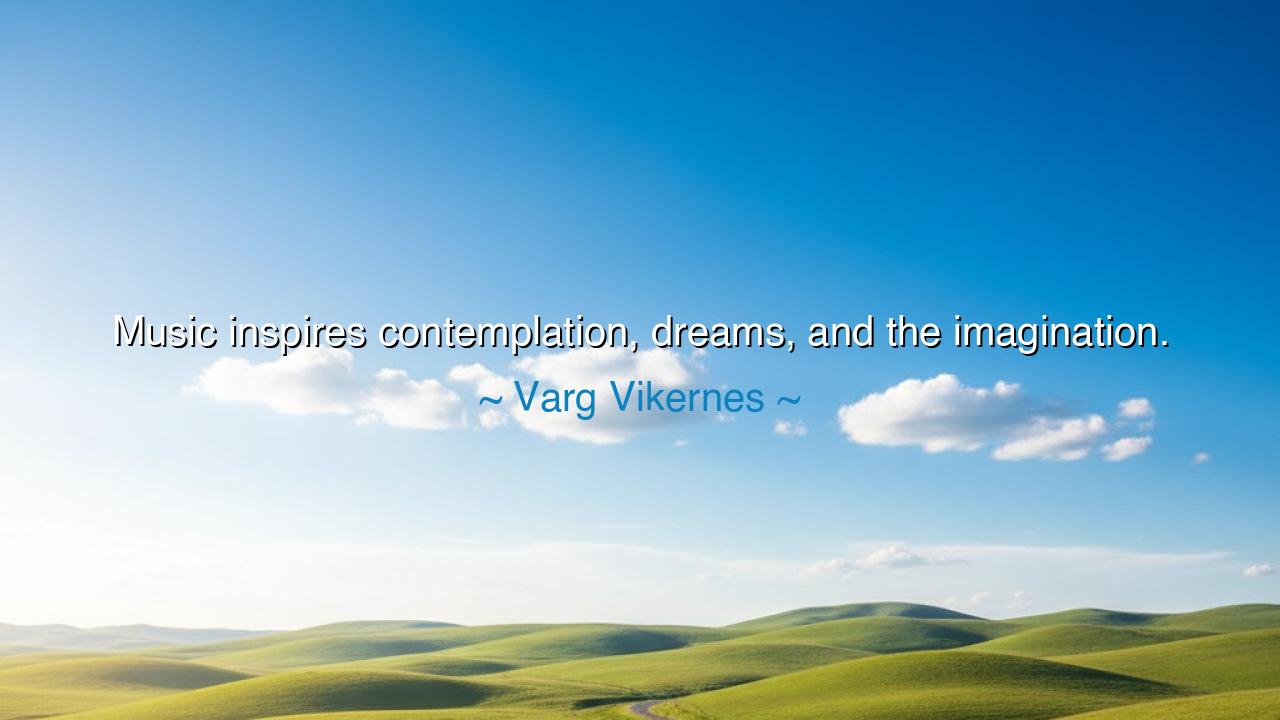
Music inspires contemplation, dreams, and the imagination.






When Varg Vikernes said, “Music inspires contemplation, dreams, and the imagination,” he was speaking of one of the oldest and most mysterious forces known to humankind—music, that invisible art that enters the soul without permission and stirs what no word can reach. His words echo the ancient truth that music is not merely sound, but spirit; it is a bridge between the material and the eternal, between the human and the divine. Through music, the heart learns to think, and the mind learns to feel. It awakens within us the power to contemplate, to dream, and to imagine—three sacred fires that have shaped civilizations and carried the soul of humanity across the ages.
The origin of this thought lies deep in the history of human expression. From the first hollowed bone flute played in a prehistoric cave to the symphonies of the modern age, music has always been the mirror of our inner life. It transcends language, culture, and time. The ancients understood this power well. Pythagoras, the philosopher and mystic, taught that the movements of the heavens themselves were music—the music of the spheres, a cosmic harmony that ordered creation. To him, and to those who followed, music was not entertainment but revelation. It taught the soul to contemplate the divine order, to see in melody and rhythm the reflection of a greater truth.
When Vikernes speaks of contemplation, he means that music invites us inward, drawing the mind away from the noise of the world. It creates a stillness in which thought can ripen into wisdom. A single haunting melody can open the doors of remembrance; a solemn chord can awaken reflection upon life, love, and mortality. The monks of medieval Europe understood this well. In the vast cathedrals of stone, they sang the Gregorian chants, not for beauty alone, but to still the heart and lift the spirit toward eternity. In the echo of their voices, they found the presence of the divine. Thus, through music, contemplation becomes not a burden but a gift—a moment when time dissolves and the soul communes with what is greater than itself.
But music also gives birth to dreams. Where contemplation looks inward, dreaming looks beyond. The rhythm and melody carry us to other worlds, unseen yet vividly real. The warrior, before battle, beats the drum to summon courage; the lover hums a song that conjures the image of the beloved; the wanderer, hearing the flute, dreams of home. Beethoven, deaf yet undaunted, wrote his final symphonies in silence, guided by the music within his imagination. He could not hear with his ears, but he heard with his soul. From that inner silence rose dreams so vast that they still echo through time. In this way, music becomes the dream of the world itself, whispering of what humanity might yet become.
And then there is the imagination, that sacred fire which music kindles. It is the imagination that transforms sound into vision, that hears in melody the shape of beauty, the pulse of emotion, the story of existence. When the poet listens to music, he finds words; when the painter listens, he finds color; when the thinker listens, he finds revelation. The imagination, fed by music, becomes boundless—it sees kingdoms in the air, stars dancing in darkness, and the spirit of creation moving through all things. It is through the imagination that humankind creates art, builds temples, and writes the dreams of the future.
Yet Vikernes’s words also carry a warning. In our age of haste and noise, we often forget how to listen. Music, which once led the spirit toward depth and reflection, is now too often consumed like a passing distraction. But the ancients would say: to hear truly is to be still. To contemplate, to dream, to imagine—these require silence within. The one who listens not only with the ear, but with the heart, will find in music a teacher, a healer, and a guide. It is not the loudest song that transforms us, but the one that speaks to the quiet places of the soul.
So, my listener, take this wisdom to heart: when the world grows heavy and the mind grows dull, turn to music. Let it teach you to be still, to see inwardly, to dream freely. Do not rush through sound as through life; let the melody unfold within you. Sit in silence after the song has ended and notice the echo that remains—that echo is your imagination awakening, your soul remembering itself. Music is not an escape from life; it is the breath of life itself. Through it, we remember that we are not only flesh, but spirit—creatures born to contemplate, to dream, and to imagine.
Thus, as Varg Vikernes reminds us, music is not merely heard—it is experienced, felt, lived. It is the river that carries the soul toward understanding. It calls us to look inward, to lift our gaze to the unseen, and to remember that the imagination, once awakened, is the truest form of freedom. For where there is music, there is the eternal voice of creation—and through it, we are reminded that we, too, are part of the great symphony of the divine.






AAdministratorAdministrator
Welcome, honored guests. Please leave a comment, we will respond soon